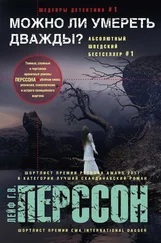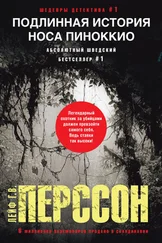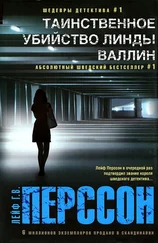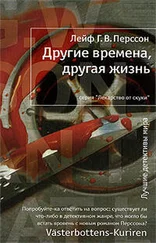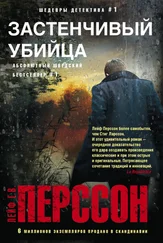“The fourth man,” said Wiklander. “I’m on it.”
As soon as Wiklander left, Johansson called Berg at home. It was high time, even just for social reasons. It had been more than a month since they’d last talked.
Berg’s wife answered. She sounded tired and depressed. Her husband was not at home and might be gone for a few more days. Could she ask him to call Johansson when he came back? She would ask, but she couldn’t promise anything. And as soon as she had said A she also said B.
Her husband had been admitted to a radiation clinic for treatment. He had been several times during the past six months and she did not want Johansson to tell anyone about it. She herself had promised her husband that.
“Erik has cancer,” she said. “We have to hope for the best.”
“If there’s anything I can do...” said Johansson. What do I say now? he thought.
“I promise to tell him that you called,” Berg’s wife interrupted, “and if it’s something to do with work then maybe you should try talking with Persson,” she suggested.
Johansson sighed as he hung up, and suddenly he felt gloomy, even though Berg wasn’t exactly a close friend. I’ll have to try Persson, he thought, looking up the number on his computer. At least he isn’t dying of cancer, thought Johansson. Not with all that fat and that blood pressure.
“Yes,” said Persson, succeeding in a single word at sounding as cheerful as Berg’s wife had when she had answered the phone.
“Do you have time to meet?” said Johansson, who was more like Persson than he realized and wasn’t going to risk any small talk.
“If you want, you can have roast pork and brown beans in an hour,” said Persson morosely. “If you want a drink you’ll have to bring it with you. I’m all out here at home.”
“I’ll stop at the liquor store, then I’ll see you in an hour,” said Johansson heartily. That’s a real old-time policeman there, he thought. He himself had all the time in the world. His wife was away at a conference, and the alternative would have been to eat alone or in the company of the TV. Without having any idea of Persson’s domestic talents he was willing to take the risk.
Persson lived in Råsunda, in one of the old fin de siècle buildings north of the soccer stadium. On the way there Johansson had his taxi stop at Solna Centrum while he trotted into the state liquor store and bought some strong beer, a bottle of pure aquavit, and half a bottle of Grönstedts cognac. No reason to be stingy, thought Johansson. If his meeting with Persson didn’t produce any results he could always enter it as a work expense, to be forwarded to that myth-enshrouded blue book, the royal realm of Sweden’s most secure storage place for such information.
I never cease to be amazed, thought Johansson half an hour later as he sat in the kitchen of Persson’s small two-room apartment while his host was just pouring a refill in their shot glasses. If Johansson remembered correctly, Persson had lived as a bachelor since separating from his wife in the early seventies, and at work he had been known for going around, regardless of the season, in the same gray suit, same yellowing nylon shirt, and same mottled tie.
At his place there was the smell of cleanser and polished floors. It was as tidy as a dollhouse, and not much bigger. Given that Persson weighed close to four hundred pounds, he was like an elephant in a china shop. An elephant, however, who had the gracefulness of a ballerina and who was as skilled in the art of cooking as Johansson’s beloved aunt Jenny. In the good old days she’d been in charge of the bar at the Grand Hotel in Kramfors and had supplied both lumber barons and ordinary gamekeepers with the finer things in life.
“This is damned good,” said Johansson emphatically, and because his wife was at a safe distance at a conference in southern Sweden he was finally free to let loose both his genetically inherited Norrland taste buds and his always tight-fitting belt.
“Real men should have good food,” Persson muttered, rocking his shot glass meaningfully. “By the way, I heard you got married.”
“Yeah,” said Johansson. “Although it’s been a while now.” A little over ten years to be more exact. You’re your usual self, thought Johansson, feeling almost moved by Persson’s concern.
“Personally I’ve had the same thought since I got divorced,” said Persson, as if thinking out loud. “But it never worked out. Though I do have a lady friend I see now and then.”
“Oh yeah?” said Johansson. What the hell should I say? he thought. I can’t really ask if she’s nice.
“She’s a good woman,” said Persson, reading Johansson’s mind. “She’s Finnish. Works in home services, but she’s going to retire soon too. We’ve talked about buying something in Spain.”
“It’s supposed to be a little warmer there.” Persson in Spain, thought Johansson. Where the hell do people get such ideas?
“Yes, I guess I’m afraid of that,” Persson sighed. “Skoal then.”
Then they toasted, turned their attention to the food, made coffee, and went to sit in Persson’s living room to talk police work.
“You’re a good fellow, Johansson,” said Persson. “Aquavit and Grönstedts,” he continued, nodding at his large cognac glass. “It’s risk-free sending you to the liquor store. I knew that all along. What can I help you with?”
“The West German embassy,” said Johansson. Just as well to get this cleared up now so we can talk old memories, thought Johansson.
“If you mean the West German embassy in April ’75, well, that was before I came to SePo,” said Persson. “I was working at the old burglary squad at the time. With a lot of tattooed idiots who were high as kites and rummaged around in people’s apartments all day long.”
“After that,” said Johansson. “Since you came to SePo?” I wonder why he doesn’t ask why I’m asking? he thought.
“I was in on that case in ’89,” said Persson. “It was Berg who asked me. It was at the very end of ’89, in December.”
Johansson just nodded. More’s coming, he thought. You couldn’t rush Persson.
“It was in connection with a murder,” said Persson. “Berg wanted me to check up on a Kjell Göran Eriksson who had been killed on the evening of the thirtieth of November. It was roughly the same time as those bastards were about to burn down the whole city to celebrate that Charles XII was dead.” Persson shook his head and took a substantial sip from his glass.
“Why was he interested in him?” asked Johansson.
“It had something to do with the West German embassy,” said Persson. “I don’t know how much you know, but—”
“A little,” said Johansson, nodding at him to continue.
“You didn’t have to be much of a policeman to figure out that the Germans inside the embassy must have had help from some of our domestic talents... on the outside. I did that myself when I was working at burglary and trying to knock a little sense into the thieves,” said Persson.
“How did Eriksson come into the picture?” Johansson asked.
“He was one of the ones who helped the Germans,” said Persson, looking almost surprised at the question. “Berg figured that out almost immediately. He was a capable cop, Erik. At that time,” said Persson, and for some reason he grinned at Johansson. “Before he became a fine fellow... if you know what I mean, Lars?”
“I know what you mean,” said Johansson, and he smiled too. “I know exactly what you mean,” he added with more emphasis than he perhaps had intended.
“Are you wondering why Eriksson didn’t get sent to prison?” asked Persson, who could definitely read minds. “Him and his other buddies.”
Читать дальше

